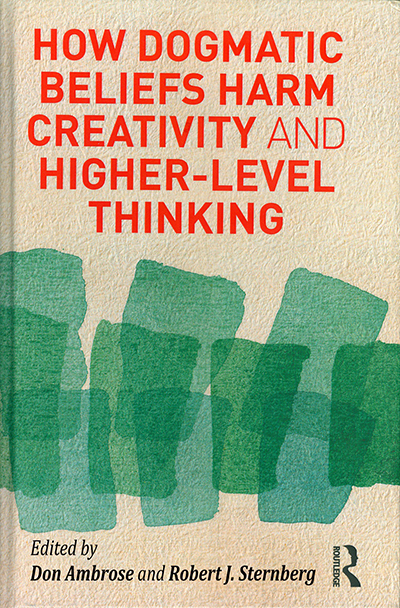by Aimee LaBrie
Author, Speaker and Award-Winning Teacher Seeks Solutions to Longtime Challenges
Dogmatic beliefs can lead to serious consequences – disastrous wars, economic collapse, genocide and authoritarian rule, to name a few. Dr. Don Ambrose, Professor of Graduate Education in the College of Liberal Arts, Education, and Sciences, has published numerous books, including two on dogmatism – How Dogmatic Beliefs Harm Creativity and Higher Level Thinking (with Robert Sternberg) and Confronting Dogmatism in Gifted Education (with Robert Sternberg and Bhararth Sriraman). They include chapters by leading thinkers from multiple academic disciplines. Some collaborators in these projects include psychologists Howard Gardner, Dean Keith Simonton, James Kaufman, Mark Runco and Bob Altemeyer; historian Andrew Bacevich; sociologist Daniel Chirot; legal scholar Meir Dan-Cohen; political philosopher Kristen Renwick Monroe; and educational researcher David C. Berliner.
These books and his other work will be highlighted on the Routledge Education Arena Expert Panel website throughout 2014. Each year, Routledge selects a few scholars to feature in this way. This work has led to invitations for Ambrose to speak at academic conferences around the world. Recently, he presented keynotes in Dubai; Istanbul; Jerusalem; Ulm, Germany; and Winnipeg, Canada; and he will be doing another in Kraków, Poland. His appearances at these conferences illustrate the recognition he has as a leader of interdisciplinary scholarly work and as the editor of the Roeper Review, a leading journal in gifted education.
This past fall, Ambrose also received Rider’s Frank N. Elliot Award for faculty in recognition of his outstanding work at the University. Ambrose views this scholarship as a way to generate positive change and dialogue among disciplines that otherwise operate in silos. “It’s hard to understand any of the big issues without looking at them from an interdisciplinary perspective. Dogmatism pervades everything: academia, the newsroom, politics, our personal lives. When we start to exchange ideas, we begin to create solutions.”

